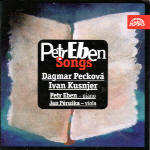These five song cycles by Petr Eben date between 1951 and 1963, when the Czech composer was in his early 20s and 30s. Folk music and speech patterns inform Eben’s communicative lyric gift, along with a multi-lingual bent for text setting. The Six Love Songs, set to medieval texts of various origins, plus The Most Secret Songs and Songs from Tèsin Country evoke the uncompromising, gnarlier side of neo-romantic composers like Samuel Barber. Rich, flowing piano accompaniments, expertly dispatched by the composer at the keyboard sensitively dovetail the soaring vocal lines. Six Rilke settings from 1961 are stark and pared-down in comparison. The six Loveless Songs for alto voice and viola make a striking impression with their gritty textures and bare-bones expressivity. Mezzo-soprano Dagmar Pecková’s pliable, dark timbre is perfect for this repertoire, but she desperately needs a diction coach for the non-Czech texts. Baritone Ivan Kusnjer’s low notes tend to be dry and unfocused, in contrast to his pleasing, lightweight sonority on top and above the staff. Full texts and translations are included.
































